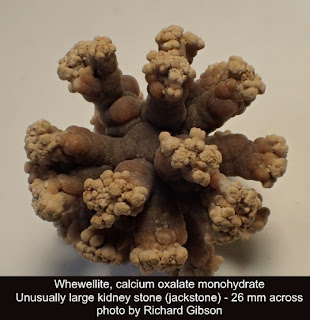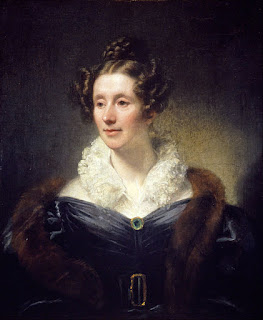This episode is about some of the interestingconnections that arise in science.
We’ll start with me and my first professional job as amineralogist analyzing kidney stones. My mineralogy professor at IndianaUniversity, Carl Beck, died unexpectedly, and his wife asked me as his onlygrad student to carry on his business performing analysis of kidney stones. Beckhad pioneered the idea of crystallographic examination to determine mineralogyof these compounds because traditional chemical analysis was misleading. For example,some common kidney stones are chemically calcium phosphates and calciumcarbonates – but they are hardly ever calcium carbonate minerals. That makes abig difference in terms of treatment, because calcium carbonate minerals can bedissolved with acids, while calcium phosphate cannot. The carbonate is actuallypart of the phosphate mineral structure, partially substituting for some of thephosphate. Other subtleties of mineral crystallography can distinguish between differentminerals and can point to specific kinds of treatments, more than justchemistry can.
 One of the most common minerals in kidney stones is calledwhewellite – calcium oxalate, CaC2O4 with a water molecule as part of its structure.In kidney stones it usually forms little rounded blobs, but sometimes the waythe mineral grows, it makes pointy little things called jackstones, for theirsimilarity to children’s’ jacks. And yes, those can be awfully painful, or so I’mtold. Whewellite is really rare in thenatural world beyond the urinary system, but it does exist, especially inorganic deposits like coal beds. Whewellite was named for William Whewell,spelled Whewell, a true polymath and philosopher at Cambridge University inEngland during the first half of the 19th century. He won the RoyalMedal for his work on ocean tides and published studies on astronomy,economics, physics, and geology, and was a professor of mineralogy as well.
One of the most common minerals in kidney stones is calledwhewellite – calcium oxalate, CaC2O4 with a water molecule as part of its structure.In kidney stones it usually forms little rounded blobs, but sometimes the waythe mineral grows, it makes pointy little things called jackstones, for theirsimilarity to children’s’ jacks. And yes, those can be awfully painful, or so I’mtold. Whewellite is really rare in thenatural world beyond the urinary system, but it does exist, especially inorganic deposits like coal beds. Whewellite was named for William Whewell,spelled Whewell, a true polymath and philosopher at Cambridge University inEngland during the first half of the 19th century. He won the RoyalMedal for his work on ocean tides and published studies on astronomy,economics, physics, and geology, and was a professor of mineralogy as well.
 Mary Somerville, 1834 painting by
Mary Somerville, 1834 painting by
Thomas Phillips - sourceWhewell coined many new words, particularly the word “scientist.”Previously such workers had been called “men of science” or “naturalphilosophers” – but Whewell invented the new word scientist for a woman, MarySomerville. Somerville researched in diverse disciplines, especially astronomy,and in 1835 she became one of the first two female members of the RoyalAstronomical Society, together with Caroline Herschel, discoverer of manycomets and nebulae.
In 1834 Somerville published “On the Connexion of thePhysical Sciences,” a synthesis reporting the latest scientific advances inastronomy, physics, chemistry, botany, and geology. William Whewell wrote areview in which he coined the word scientist for Somerville, not simply toinvent a gender-neutral term analogous to “artist,” but specifically to recognizethe interdisciplinary nature of her work. And even more, according to Somerville’sbiographer Kathryn Neeley, Whewell wanted a word that actively celebrated “thepeculiar illumination of the female mind: the ability to synthesize separatefields into a single discipline.” That was what he meant by a scientist.
Somerville was born in Scotland in 1780 and died in 1872 atage 91. Her legacy ranges from a college, an island, and a lunar crater namedfor her to her appearance on Scottish bank notes beginning in 2017. Besides themineral whewellite, William Whewell is also memorialized in a lunar crater andbuildings on the Cambridge campus, as well as in the word scientist, includedin the Oxford English Dictionary in 1834, the same year he coined it. He diedin 1866.
—Richard I. Gibson
Join Podchaser to...
- Rate podcasts and episodes
- Follow podcasts and creators
- Create podcast and episode lists
- & much more
Episode Tags
Claim and edit this page to your liking.
Unlock more with Podchaser Pro
- Audience Insights
- Contact Information
- Demographics
- Charts
- Sponsor History
- and More!

- Account
- Register
- Log In
- Find Friends
- Resources
- Help Center
- Blog
- API
Podchaser is the ultimate destination for podcast data, search, and discovery. Learn More
- © 2024 Podchaser, Inc.
- Privacy Policy
- Terms of Service
- Contact Us
